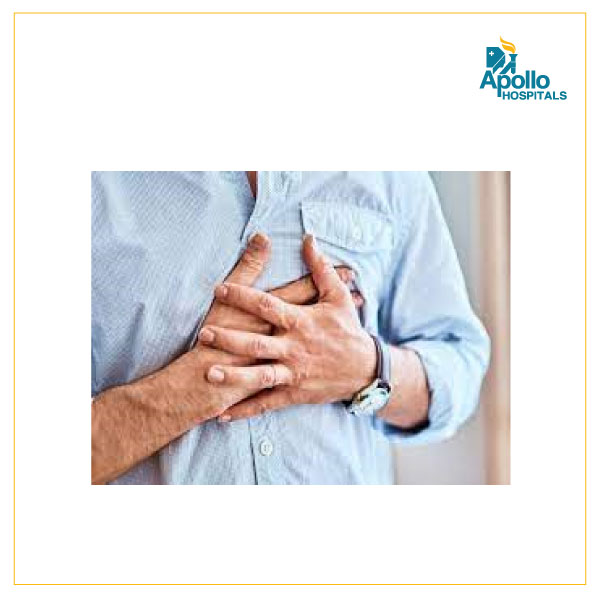What is Sudden Cardiac Dysfunction?
- 829 Views
- Apollo Hospital Mumbai
- June 1, 2023
- Cardiac sciences
Sudden Cardiac Dysfunction – Causes, Symptoms and Emergency Treatment

Verified by: Dr. Nitin Jagasia, Head-Emergency Services, Apollo Hospitals Navi Mumbai
Sudden Cardiac Dysfunction/arrest is probably one of the largest causes of natural death in the world. You are most likely to have at least one acquaintance in life who has survived a cardiac arrest (or not). This kind of heart related disorder is known to occur most commonly in adults within the age range of mid 30s to late 40s and twice as much in males than females.
This dysfunction of the heart leads to the abrupt stoppage of the heart functions, loss of breathing and consciousness, and could lead to death if not treated immediately. So, let’s take a closer look at what it actually is.
Symptoms of Sudden Cardiac Dysfunction
In many cases, sudden cardiac arrests take place without any prior symptoms and signs. But sometimes there are drastic signs and symptoms, such as:
- Dizziness
- Shortness of breath
- Palpitations
- Sudden collapse
- No pulse
- Losing consciousness
- Weakness
- Rapid heartbeat
Cause and conditions that could lead to sudden cardiac arrests
The most common cause of sudden cardiac dysfunction is an abnormal heart rhythm better known as arrhythmia. The electrical system of the heart is responsible for controlling the rate and rhythm of the heartbeat. If something goes wrong with it, your heart starts beating fast and at irregular rhythms.
Following are some heart conditions which could lead to a sudden cardiac arrest:
- Coronary Artery Disease: Most of the people who are inflicted with a sudden cardiac arrest are found to be patients of coronary artery disease. This is a medical condition where the arteries of the heart become clogged with deposits such as cholesterol, thus decreasing the blood flow to the heart.
- Enlarged Heart: This condition also known as cardiomyopathy occurs when the heart’s muscular walls abnormally stretch and thicken.
- Congenital Disease: If you witness a sudden cardiac arrest in children or young adults, it’s mostly due to a heart disease that’s been there since birth (congenital). Adults who have undergone corrective surgeries for their congenital heart diseases are also at a higher risk of sudden cardiac dysfunctions.
- Heart Attack: In times of a heart attack, it is capable of triggering ventricular fibrillation and consequent sudden cardiac arrest. Heart attacks also leave behind scar tissues in the heart which could lead to abnormalities in the heart rhythm.
- Electrical System Issues: In certain cases, the problem lies in the heart’s electrical system itself and is known as primary heart rhythm abnormalities.
Risk Factors of Sudden Cardiac Dysfunction
There are quite many factors which could increase a person’s risk of sudden cardiac arrest and consequent death. These include:
- Obesity
- Smoking
- A family history of coronary artery disease
- Diabetes
- High cholesterol
- A sedentary lifestyle
- Chronic kidney disease
- High blood pressure
Emergency Treatment of Sudden Cardiac Arrest
Survival of a sudden cardiac dysfunction is as high as 90% if the above measures are taken in the first few minutes. One should remember the emergency number 1066 in case one witnesses an individual suffering from sudden cardiac dysfunction. By the time the ambulance arrives for further medical assistance, the witness can check for vital signs like heart rate, breathing and pulse along with the state of consciousness.
On finding abnormal or absence of vital signs, you may begin chest compressions until help arrives. This emergency step ensures that the victim does not suffer from complications and at times may even recover temporarily until a doctor attends to him.
Apollo Hospitals Navi Mumbai has a well-equipped Emergency Room to handle all complex medical emergencies with internationally trained doctors and support staff.
So, remember to dial 1066 in case of a medical emergency for immediate medical assistance.
Conclusion
Now that you know all about SCD and the crucial role of time in it, your job is to educate as many friends as possible and family about the condition and immediate care required. You could also put in efforts to reduce your own risk of a sudden cardiac arrest by living a healthy lifestyle, being screened for heart conditions regularly, and going for regular check-ups to your physician.
- December 26, 2024
Robotic Surgery in Orthopedics
- December 26, 2024
Revolutionizing GI and HPB Surgery: The Role of Robotics
- December 26, 2024
COPD: A Chronic Respiratory Challenge
- December 26, 2024
What is Minimal Access Hernia Surgery and Why is it Beneficial?
- December 26, 2024
New Advances in Diabetes Management: A Brighter Future for Patients
- November 25, 2024
Multiple Sclerosis (MS): Early Detection and Treatment Matter
- Bone Marrow Transplant3
- Cardiac sciences44
- Child Care7
- Clinical Excellence33
- Cosmetology2
- COVID-199
- Diseases4
- Emergency8
- Emergency10
- Endocrinology1
- ENT5
- Fetal Medicine1
- Gastroenterology8
- General Medicine11
- General Surgery4
- Genomic Medicine2
- Gynecology1
- Health14
- Hematology2
- Kidney Transplant5
- Kidney Transplant2
- Liver Transplant6
- Neonatology1
- Nephrology2
- Nephrology & transplant1
- Nephrology & Urology4
- Neurosciences1
- Neurosciences21
- Nutrition/Diet1
- Obstetrics & Gynecology9
- Obstetrics & Gynecology4
- Oncology92
- Oncology3
- Ophthalmology1
- Orthopedic14
- Patient Speak1
- Pediatric Surgery4
- physiotherapy2
- Psychologist2
- Pulmonology3
- Rheumatology1
- Robotic Suregry1
- Robotic Surgery11
- Spine1
- Uncategorized111
- Women Care5
